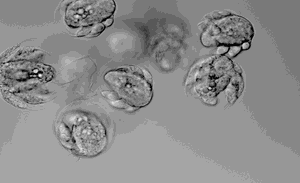From marine plankton, microorganisms capable of degrading bioplastics
For the first time, thanks to the collaboration with the University of Pisa (Departments of Civil and Industrial Engineering and Biology), Aquarium-Costa Edutainment S.p.A, Azienda Servizi Ambientali ASA SpA of Livorno, Zhejiang Ocean University (ZJOU) and the joint Sino-Italian Laboratory ZJOU-ISPRA, it has been demonstrated that the microbiome associated with plankton, reared in the ISPRA laboratories, is able to metabolise plastics used in the marine environment, in a relatively short time and at ambient temperature. These encouraging results lead to new hypotheses for the biotechnological utilisation of marine plankton, particularly in the fight against bioplastic pollution and the transformation of contaminated marine matrices (bioremediation).
Marine plankton consists of an animal component (zooplankton) and a plant component (phytoplankton); together they form the basis of the marine food chain and support the life cycles of all aquatic organisms. Zooplankton is predominantly represented by copepods, tiny crustaceans that are considered the 'insects of the sea' as they are the most abundant animals in the oceans. Copepods feed on phytoplankton, thus occupying the basic trophic level supporting the entire marine food chain, and are, in turn, the prey of numerous marine organisms.
The feeding strategy of copepods, which uses a water filtration system to concentrate small phytoplankton cells, turns them into microbial biodiversity hotspots, i.e. concentrators of micro-organisms; these can then reach very high densities around the copepods, compared to those found in the water column. Such microbial communities are adapted to grow on substrates that are very resistant to degradation, including complex macromolecules such as, for example, chitin, the main element of the exoskeleton of crustaceans, to which copepods belong.
The idea behind the study was to see if, among these copepod-associated microrganisms, we could isolate some capable of degrading plastic macromolecules.
The environmental unsustainability of petro-plastics (derived from oil) and their near-infinite persistence in the environment have promoted the development of next-generation materials in the form of bioplastics. Over the past 20 years, the use of bioplastics has increased significantly, including in the marine environment, and with it the need to identify candidate microbiota capable of promoting their degradation.
For the first time, it has emerged that certain bacterial components associated with copepods reared in ISPRA's Livorno laboratories, are able to initiate, after a few days (82 days) and at room temperature (20°C), a process of hydrolysis of the ester bonds of PBSA, one of the most common polyester bioplastics, which is also proposed for the creation of nets to restore Posidonia oceanica meadows in degraded marine environments.
The microorganism isolated from copepods showed the ability to break the polymer chain of PBSA by acting particularly in the crystalline regions, which are generally less accessible to degradative activities. The results of this study represent an important starting point to further investigate the biodiversity of microorganism communities associated with marine plankton, potentially useful in the biotechnological field.
Link to the study: sciencedirect

